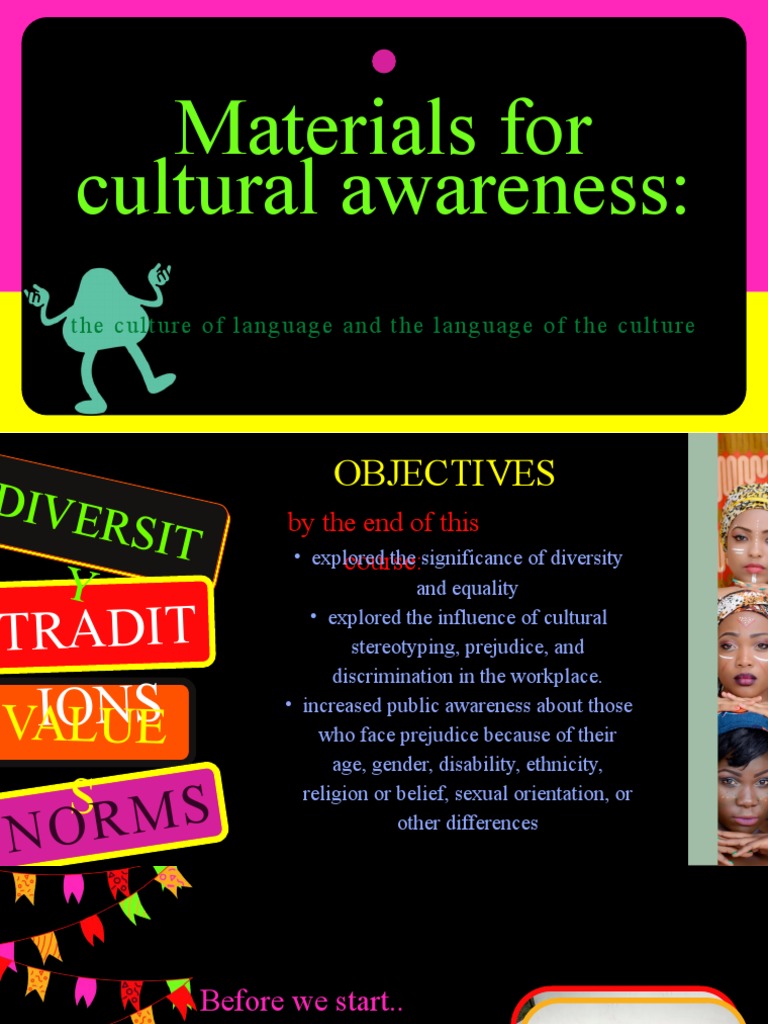In today’s globally interwoven society, the importance of cultural awareness cannot be overstated. The multifaceted nature of cultures, traditions, and languages embodies a rich tapestry of human experience that merits exploration. Cultural awareness training materials serve as indispensable tools, enabling individuals and organizations to navigate the complexities of intercultural interactions. Such training promises a profound shift in perspective, providing participants with insights that challenge preconceived notions while piquing curiosity about the myriad cultures that populate our world.
The need for cultural awareness is accentuated in various spheres including workplaces, educational institutions, and social settings. As globalization continues to foster interconnectivity among diverse populations, the potential for misunderstanding and conflict arises. Training materials aimed at enhancing cultural awareness are designed to address these challenges by equipping learners with knowledge and skills that encourage empathy, respect, and appreciation for cultural differences.
One of the core tenets of effective cultural awareness training is the promotion of a shift in perspective. Traditional training methodologies often focus on mere theoretical knowledge, emphasizing facts about various cultures—such as languages, customs, and values. However, the transformative training materials go a step further, compelling participants to engage in self-reflection. This self-examination catalyzes a broader understanding of how one’s own cultural background influences perceptions and interactions with others.
To foster this shift in perspective, training materials incorporate a variety of learning methodologies. Case studies offer real-world scenarios that illuminate the complexities of cultural exchanges. Role-playing exercises enable individuals to step into the shoes of others, cultivating empathy and a nuanced understanding of diverse worldviews. Through experiential learning, participants are encouraged to transcend stereotypes and embrace a more expansive worldview.
Moreover, cultural awareness training materials meticulously delineate between surface-level cultural attributes and deeper cultural elements. While superficial traits such as food, dress, and music are readily observable, the values, beliefs, and norms that shape a culture’s mind-set often remain in the background. By delving into these underlying cultural factors, training can elucidate how they impact behaviors and decision-making processes in a multitude of contexts, from business negotiations to interpersonal relationships.
Another significant aspect of cultural awareness training is its ability to pique curiosity. In an era where misinformation frequently proliferates, the urge to explore different cultures can be a powerful motivator for fostering understanding. Engaging training materials utilize intriguing narratives, visual aids, and stimulating discussions to captivate audiences and encourage them to ask questions beyond the surface of cultural practices. This curiosity can lead to deeper explorations of foreign customs and traditions, ultimately contributing to a richer understanding of the global community.
Furthermore, the role of language in shaping cultural perception cannot be overlooked. Language is not merely a tool for communication; it is a vehicle for conveying complex cultural ideals and emotions. Training materials that include language modules can demonstrate how linguistic nuances reflect cultural values. For instance, concepts of politeness, time, and social relationships vary significantly across cultures and can greatly influence communication styles. Participants who engage with these language aspects begin to comprehend the subtleties that underscore interactions, enriching their intercultural competencies.
Additionally, the significance of storytelling as a pedagogical tool in cultural awareness training should not be undervalued. Stories encapsulate the essence of human experience and serve as conduits for cultural transmission. By sharing personal anecdotes or historical narratives, trainers can contextualize abstract ideas, making them relatable and memorable. This narrative-driven approach emphasizes not only the distinctiveness of various cultures but also highlights universal themes that connect humanity.
The availability of digital resources further enhances the effectiveness of cultural awareness training. Online platforms and virtual training modules can present a treasure trove of multimedia resources, including videos, podcasts, and interactive quizzes. These resources enable learners to engage in self-paced exploration of cultural elements that resonate with their curiosity. Additionally, forums and online discussion groups can provide communal learning opportunities, fostering an environment where diverse perspectives converge.
Nevertheless, the efficacy of cultural awareness training materials hinges on their adaptability to specific contexts. Different organizations or institutions may face unique cultural dynamics that require tailored approaches. Training materials must be flexible enough to accommodate these variances while maintaining core principles of cultural sensitivity and inclusivity. This adaptability ensures that the training remains relevant and effective across diverse settings.
As we embark on the journey of fostering global cultural awareness, the ultimate objective extends beyond mere comprehension. It aspires to cultivate a collective sense of responsibility whereby individuals advocate for inclusivity and understanding. Promising a shift in perspective, cultural awareness training materials hold the key to unlocking a world rich in diversity. By piquing curiosity and nurturing empathy, these educational resources not only enhance interpersonal interactions but also contribute to a more harmonious global society.
In conclusion, the role of cultural awareness training materials is indispensable in today’s world. They not only provide the necessary knowledge and skills to navigate cultural differences but also encourage individuals to engage in self-reflection and foster curiosity about the diverse tapestry of human existence. A deepened understanding of cultural dynamics can profoundly impact lives and communities, helping individuals and organizations thrive within an increasingly interconnected world.
